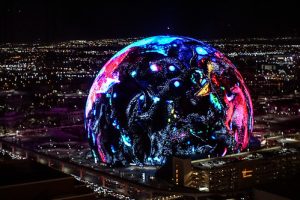Can A.I. Rethink Art? Should It?

The skeleton seems to be at the epicenter of a mystifying ritual.
In a new work by the French artist Pierre Huyghe, robots powered by artificial intelligence film the unburied remains of a man, and periodically position objects next to it in a ceremony that only they seem to understand. The scene takes place in the Atacama Desert in Chile, one of the planet’s oldest and driest deserts.
“Camata” is on view at the Punta della Dogana – Pinault Collection exhibition space, in a show concurrent with the Venice Biennale (through Nov. 24). It’s a stirring example of the increasing overlap between art and artificial intelligence, or A.I.
Those two vowels, placed side by side, seem to present a menace to many disciplines whose practitioners risk being replaced by smart and autonomous machines. Humanity itself could, at some future point, be replaced by superintelligent machines, according to some globally renowned thinkers and philosophers such as the Israeli historian Yuval Noah Harari and Stephen Hawking.
So why are artists dabbling with A.I.? And do they risk being extinguished by it?
“There’s always been an attraction, on the part of artists, for chance: something which is beyond your own control, something that liberates you from the finite subject,” said Daniel Birnbaum, a curator who is the artistic director of the digital art production platform Acute Art and a panelist at the Art for Tomorrow conference here this week convened by the Democracy & Culture Foundation with panels moderated by New York Times journalists.
Birnbaum said that Huyghe was among the artists who — rather than “overwhelming us with A.I.-generated nonsense from the internet” — are interested in exploring “places where nature and artificiality merge,” and where “biological systems and artificial systems somehow collaborate, creating visually strange things.”
In the world at large, Birnbaum acknowledged, there were “frightening scenarios” whereby artificially intelligent systems could control decisions made by governments or the military, and pose grave threats to humanity.





